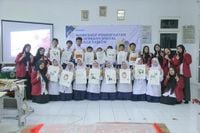On May 9, 2025, Balai Bahasa Provinsi Bengkulu (BBPB) kicked off its selection process for language ambassadors, a vital initiative aimed at promoting the use of the Indonesian language and regional dialects. The selection, which is currently in its interview and talent testing phase, started with over 100 applicants, but has now narrowed down to 70 candidates who have successfully passed the administrative screenings and the Indonesian Language Proficiency Test (UKBI).
According to Andriana Yohan, the head of BBPB, the selection process will continue until only 20 pairs of participants remain. These finalists will go on to represent Bengkulu at the national language ambassador event. "From these 20 pairs, we will continue to filter down to find the best representatives," Andriana explained on Friday.
As language ambassadors, the selected individuals are expected to be proficient in Indonesian and ideally possess knowledge of local dialects and foreign languages. This aligns with the Tri Gatra Bangun Bahasa philosophy, which emphasizes prioritizing the Indonesian language, preserving local languages, and mastering foreign languages.
During the interview sessions, panelist Yusuf, an employee at BBPB, stressed the importance of understanding what it means to be a language ambassador. "These ambassadors will be at the forefront in strengthening the use of Indonesian in various opportunities. They will also serve as role models for younger generations to love their regional languages and use them when necessary," he concluded.
In a separate initiative, on May 6, 2025, students from the Teacher Professional Education Program (PPG) at Muhammadiyah University of Surabaya (Unmuh Surabaya) introduced a digital literacy innovation at SMP Muhammadiyah 11 Surabaya (SMPM 11). The event, titled "Pemanfaatan Tas Literasi Bahasa Indonesia Berbasis Digital" or PETALIBAS, was held in the school's IPA Laboratory and attended by seventh-grade students, faculty members, and school administrators.
PETALIBAS aims to merge digital and practical approaches in teaching the Indonesian language. The literacy bags used in the program are equipped with interactive reading materials accessible through QR codes, allowing students to engage with the content using their devices. "This activity represents an innovative implementation of technology-based learning that we studied during our teacher training," said the event's coordinator from the PPG students.
Vice Principal Ika Ristanti expressed appreciation for the PPG students' contributions, stating, "We welcome this initiative as it aligns with the school's spirit of continuous innovation in education. We hope this activity can inspire students' enthusiasm for literacy." Throughout the event, students eagerly participated, practicing scanning barcodes to access various literacy materials. They were also encouraged to write reflections and discuss the readings they explored.
Through PETALIBAS, the goal is not only to enhance students' academic literacy but also to help them adapt to technological advancements. This initiative exemplifies how innovation and technology can be integrated into Indonesian language learning in an engaging and meaningful way.
Meanwhile, Prof. Dr. Hendrokumoro, M. Hum., a professor at the Faculty of Cultural Sciences (FIB) at Universitas Gadjah Mada (UGM), emphasized the need for deeper studies on Javanese and other regional languages in Indonesia. During his speech on May 9, 2025, titled "The Existence of the Javanese Language Today along with its Roles, Challenges, and Opportunities," he highlighted that the number of Javanese speakers is estimated to exceed 80 million.
Hendrokumoro pointed out that the use of Javanese is increasingly confined to specific contexts, such as within families or traditional communities, risking marginalization due to the dominance of Indonesian and foreign languages. He urged the need for strategies and policies to support the preservation of the Javanese language amid evolving social dynamics.
He articulated, "Language not only reflects cultural values and norms but also actualizes everyday life. Through language, individuals express their life experiences, shape social interactions, and construct meanings within specific cultural and historical contexts."
Javanese expressions, he noted, hold profound meanings that contribute to shaping societal values and character. "Efforts to preserve and develop the Javanese language require serious attention, as this language embodies local wisdom and significant cultural dimensions that can greatly benefit society," he added.
Hendrokumoro is one of the 530 active professors at the university level and among the 17 out of 45 professors that FIB UGM has ever had. He concluded that if these preservation efforts are effectively realized, they could strengthen the existence of the Javanese language and enhance its economic value.
These initiatives across various educational institutions underline a collective effort to promote language proficiency, cultural heritage, and literacy in Indonesia. As the nation navigates globalization and technological advancements, fostering a love for local languages while embracing modernity remains a crucial endeavor for educators, students, and language advocates alike.




